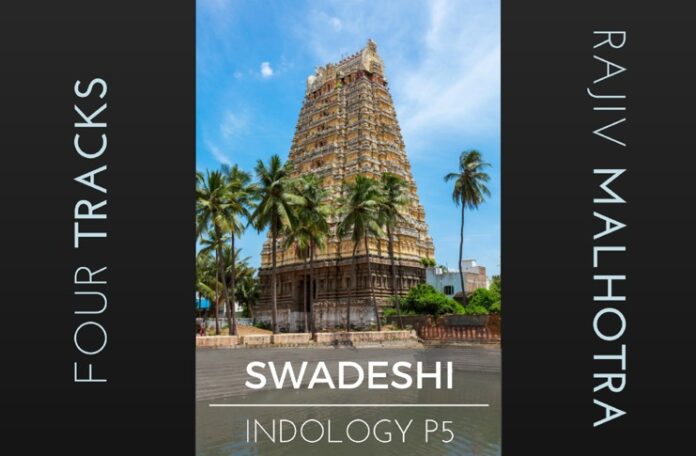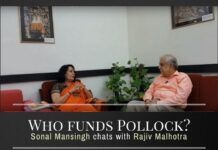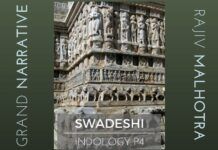
Part 1 of this series can be accessed here. Part 2 is available here. Part 3 talks about the abuse of Sanskrit as an oppressor language. Part 4 discusses the Grand Narrative. This fifth and final segment discusses the four tracks of Indology.
[dropcap color=”#008040″ boxed=”yes” boxed_radius=”8px” class=”” id=””]S[/dropcap]o even, the Gandhi movement did not create succession of that caliber. I gave you the examples of the Indian left importing from the west, those five generation of Indology after Independence. That’s how much innovation they are doing. We need to create schools of thought. So it’s not just one person and when he’s gone that idea is finished. It has to be development of the school of thought so that thought has to be transmitted to the next generation and turned into institutions. So, we need narrative. Narrative feeds ‘Parampara’ and ‘Parampara’ becomes institution. That is basically what I am talking about.
I found that you cannot give a grant and pay somebody to change his mind against the whole establishment that he works in.
Just to give you a little background, I have a Infinity Foundation. And now we have created Infinity Foundation India based in Chennai. Our Yagna, first of all has been to study the Kurukshetra in a very detailed way. Looking at the supply chains through which knowledge is being produced by our opponents. Many kinds of opponents, who funds them, where does the talent come from. How do they take knowledge, human resource and institution, combine it into a school of thought. Where are the places we want to hit if we want to dismantle them? This kind of thinking I’ve been doing for a long time, targeting several other people in the Kurukshetra and doing it pretty much single-handedly. This involves creating a database of who’s who, what they are up to and tracking it and so on. Then we funded, a lot of intellectual projects in Indology in the US and in India both at the level of conference, at the level of major books, courses to be taught, etc. And I was disappointed by that. I found that you cannot give a grant and pay somebody to change his mind against the whole establishment that he works in. He’s not going to do that. So eventually I decided, I have to do that. So that’s when I turned from Philanthropist, writing cheques and getting other people to say good things about me and making me feel good. I quickly realized that it’s not what I want. This is sham. They are not really transforming. I shifted from that to engaging the subject matter in detail, myself. I learnt this the hard way. And I found that Indology is a field, anyone can become good at. It’s a matter of pulling your time, energy, huge amount of resources, and you can master it. You don’t need to be professionally trained Indologist. Some of the best people we are working with are tech people. Engineers, Software developers, we find them very brilliant and they come up with good work. So, I became my own scholar. I also studied how other countries are controlling their discourse. I went to the Japan Foundation in the US, studied how they are doing it. I went to the China institute, went to the Korea Foundation, Tibet house, the Council of Islamic education. I went to a lot of these places and learnt how various groups are controlling their discourse, how do they manage it and I learnt a lot, how this is done.
[dropcap color=”#008040″ boxed=”yes” boxed_radius=”8px” class=”” id=””]T[/dropcap]hen we started a history of Indian science and technology project. We have produced 14 volumes, nobody else has done more than 3 volumes on this subject. You can go and buy them in stock. Each volume takes about three years, costs a lot of money, we have to get top researchers in India who is already a known expert in that field. So history of steel is different, then history of textiles, then history of Harappan architecture, then history of water management, etc. Many of these systems we have studied in great details and produced 14 books. Indus University is now a partner in this project, and we are doing this together. This is a huge project we’ve done. We had annual conferences and the funding ran out so we stopped but we’d like to revive it. It’s a constructive project. I talked about constructive and disruptive. Disruptive is: I am disrupting Wendy Doniger and Sheldon Pollock or writing about Hindu phobia. Constructive is: we are doing the history of science and technology.
Our strategies consists of four track A, B, C and D.
Another one is Indian mind Sciences, Indian Psychology. We have done huge amount of work, given lots of grants, produced a lot of original works on the Indian theory of mind, psychology because a lot of our tradition is mind science. It’s not religion in traditional sense, it’s involving your consciousness.
Now, there is the term, supply chain. Supply chain is that if you are making something then a lot of spare parts, raw materials comes from the suppliers. If you are making a car, you buy tyres, paints etc. So that is supply chain. It is a very sophisticated job. When you finish producing the product, then you distribute it through distribution channels. That is marketing. I looked at Indology as an Industry. There are a few thousand people involved in Indology. Some call it South Asian studies, some call it religious studies, anthropology, political science, etc. There are quite a lot of people outside India who are full-time scholars and think tanks, seminaries, academic work and their target is India. I looked at the supply chain from a financial point of view, in terms of knowledge, what ideology do they bring in, what ‘Siddhanta’ do they bring in. And then I looked at the distribution channel, how are they marketed, what they go through, they get Indians on their side, they get the media, they go through schools, they go through think tanks, they affect policy. So you have to look at the inputs and outputs of these people. So, I have studied that quite extensively. So based on all that, here is the final conclusion and I’ll end there and take questions. Our strategies consists of four track A, B, C and D. A is the most complex, heavy, serious, intellectual work. D is the most popular level of work and least intellectually demanding. A is our original research, either disrupting the opposing side or constructing something from our own side. So, I have written quite a few books, I want to finish writing many more and we’ll see how many I can manage to finish before I am not able to do anymore. But my goal is to keep writing these track A kind of works which are very original, very heavy amount of thinking and research is involved. It is not just a matter of picking up one line from here and there, copy-paste and put out a blog. It’s a very serious and original work. Then, there is track B. So if I am gone tomorrow, I want someone to continue this work, they have to be very hard working, scholarly, full-time. So my goal is to train 108 Swadeshi Indologists. We have given the title of Infinity Foundation research scholar to about five people so far. We did our first conference in Chennai. We had a few dozen papers, we picked the most brilliant five and we put them on a stipend and that’s how we begun our 108-project. It will take a few years to build up to world-class 108 Indologists.
[dropcap color=”#008040″ boxed=”yes” boxed_radius=”8px” class=”” id=””]N[/dropcap]ow it is not a simple matter of putting out a call for paper and saying, send us your papers. It won’t work. Most of the people who will send in the papers who have not done real work. They just send in something they already have. We found out that for every 5-6 young people, we have a mentor. So we assign a senior person, compensate them get their full time and there’s a problem area, a defined topic they are working on, and they are producing research and training these young people. So that’s how we are creating very high quality teams.
…this Yagna is collective Yagna, and we invite others to join us in this kind of enterprise.
Track C is taking on the knowledge and turning it into online courses, videos, e-learning. So, my book ‘Being Different’ is the first one we are taking as a project to develop into e-learning. So, this is for people who don’t want to read heavy books. This is to take it to the masses. Once you have done it in English then we’ll be able to translate the content into many other languages. So we are starting that project and we need some support for that. That’s our vision and we are already working on it. So every time, there’s a good original idea in track A, not only we do track B and train other people but we do track C and turn it into e-learning modules. Then there’s track D. D is the whole social media intervention. So we want to take our knowledge to the common man through small clips and tweets etc. Now, one of the most interesting comments I got on this track D was from Kanchi Shankaracharya this year. I was visiting him and having a very interesting discussion, the junior Shankaracharya, he is so excited, so interested and supportive and a great person. He says, “What you have to do is revive the ‘Kathakara’, the ‘Kalakara’, ‘Chitrakara’, ‘Patrakara’ ”. The narrator, artist, storyteller, journalist, so take these traditional perfections, learn how these things were done, modernize them and put them out in the market, that’s the multimedia, the future. What an amazing way of framing all this from a very traditional person. Not the typical guy who says we are all looking for Moksha, don’t worry about this. Shankaracharya says you need to get into all those place where Patakaras train the journalists, go to the film industry training institutes for Kalakaras and to the artist and make them spiritual. So it’s a very interesting concept I thought that he brought.
So this is my Yagna and of many fellow travelers, some of them in this room. And I would also like to tell that we live stream and we have 12 lakh followers on Facebook and large number of people watch this things so I just want to tell all the people watching that you are also the fellow travelers. You are also the part of this Yagna. So this Yagna is collective Yagna, and we invite others to join us in this kind of enterprise. It’s not that you should expect quick victory, you should have stamina to just go on. It’s not “ki thak jayenge”(I’ll get tired), if we don’t win quickly the we’ll go home, it’s not for those people.
(concluded)
You can get connected with Rajiv in any one of the following ways:
Join Rajiv Malhotra for his FB LIVE Broadcasts. Follow Rajiv on facebook.com/RajivMalhotra.Official
Twitter: https://twitter.com/RajivMessage
You Tube Video of Rajiv Malhotra: https://www.youtube.com/user/BreakingIndia
Rajiv’s discussion egroup: http://groups.yahoo.com/group/RajivMalhotraDiscussion/
Email address : Infinity.Foundation.India@gmail.com
- Part 2: Discussion between Dr. Swamy and Rajiv Malhotra - September 10, 2017
- Dr Subramanian Swamy In Conversation with Rajiv Malhotra - July 24, 2017
- P2 – Discussing the Digestion of Yoga with a White Hindu - July 3, 2017











Really, really u are doing a great job about our country heritage. We Indian people still neglecting out own heritage, culture & knowledge of our pre decessors. Am very glad to u. But I don’t know how people like us can help u, in ur great work.
Any way, go ahead. our best wishes with u always. All the best ?.
With regards
Srinivasa Bhat
09741633588
‘But I don’t know how people like us can help u, in ur great work.’
Srinivas ji, this Yajna is a process where involvement of the whole society and civilization is needed.
As far as Rajiv ji is concerned keep following him and his work for now.
Eventually you will find a way to join too.